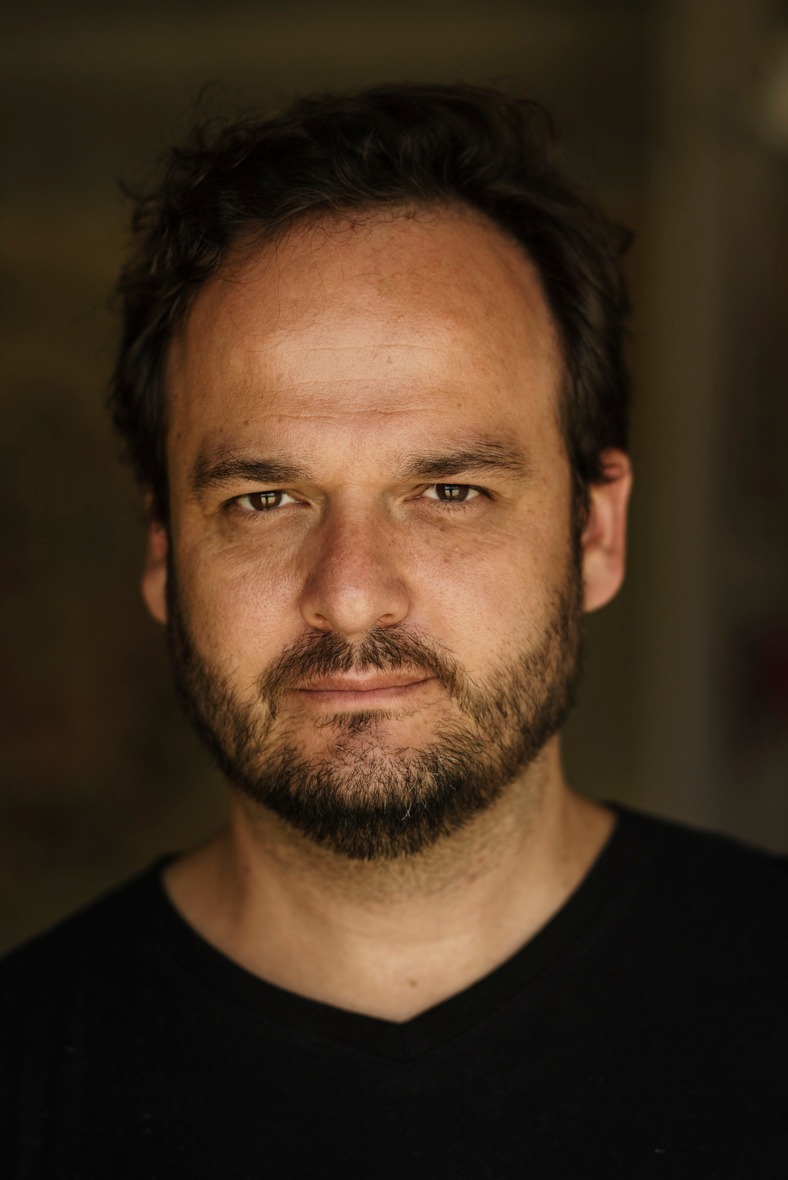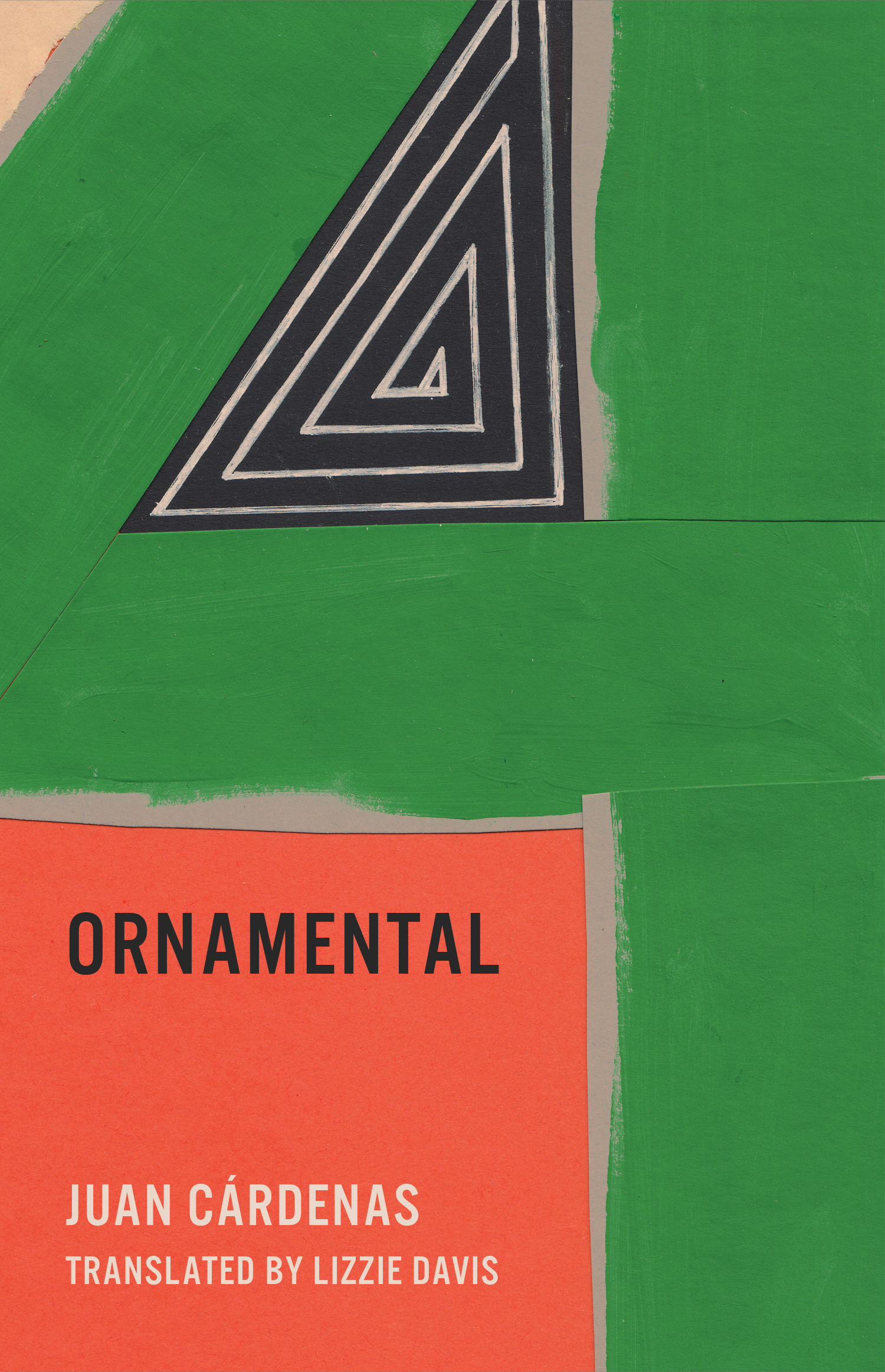Liberated Energy: An Interview with Juan Cárdenas
Interviews
By Lizzie Davis
Ornamental, Juan Cárdenas’s English-language debut, follows two “designers of artificial emotional states,” a doctor who works in chemical compounds, and his visual-artist wife. When the enigmatic number 4, a participant in the doctor’s latest drug trial, enters first their lives, then their marriage, the “circle of comfort” their status and wealth have afforded them is exploded, and the pharmaceutical industry and the art world become sites for examining the corrosive effects of privilege, entitlement, excess, and capitalistic greed.
The book is compulsively readable, and that’s one reason why I was drawn to it as a translator. But it’s just as compelling for its language and style: the rift number 4 creates in the couple’s lives is mirrored in the structure itself, when the monologues she produces under the influence interrupt and undercut the doctor’s narrative. Rhythmic, elaborate, and governed more often by sound than by sense, they encompass quotes from political speeches and historical figures, fragments of pop songs, intensely poetic language, and memories of a childhood marked by poverty and abuse. Reading them and then translating them, I thought frequently of something Juan said in another interview, one I read long before I knew Coffee House would be publishing Ornamental: “I don’t write with an agenda. The books do those things on their own. . . . I don’t think the powers of fiction should be instrumentalized. We should move in the opposite direction. The powers of fiction should be exploded, their repressed energies liberated.”
The doctor’s wife describes her practice in a way that seems to hold echoes of this idea: it’s grace, she says, that guides her; as she threads ideas together intuitively, she comes upon meaning almost without intending to. Meaning is “an accident, a surplus.” Merciless as Ornamental and number 4 are in their critique of her work, there’s something in her process that seems to wink at Juan’s own, in the pursuit of whatever’s cast back when “the affectations of consciousness are shed,” in the willingness to be guided by something other than plot or agenda.
In an effort to follow this impulse, to summon the novel’s grace and liberate its repressed energy, we’ve decided to try something a little unusual. We’ve let the text itself conduct the interview, by transcribing every question therein. As the doctor’s wife likes to say, “Perhaps we have to completely renounce our urge to interpret.”

1. Every age had its style, is our age alone to be refused a style?
The capitalistic gluttony of our era ate all the styles, but it also ate all the eras. It’s not the end of history, it’s just a great temporal and stylistic indigestion. But in the face of that capitalistic gluttony, us Latin Americans invented a very healthy alternative: the anthropophagy of Oswald de Andrade, whose famous 1928 manifesto can be summed up in one sentence: “I’m only interested in what’s not mine.” Here in the United States, there’s a widespread terror of our cannibalism, of our capacity to devour everything that isn’t ours. As a result, the terrified white man turns to labels to try and curtail the reach of our jaws, from Taco Bell to Magical Realism, which only exists in the touristic imaginations clouded by American dirt.
2. Who do you think is prettier, your grandma or your mom?
That’s a tough one. My grandma died three years ago, and we transformed her ashes into a beautiful garden with colorful flowers and tropical plants. My mom takes care of it, and that makes her prettier, I guess.
3. How’s the septum? Is it healing OK?
Ask your own mother, but I think it will eventually heal.
4. What kinds of scenes?
I’ve always imagined Ornamental’s little scenes like dioramas of the natural history of destruction.
5. What about that last discourse? Was it also inspired by her mother’s little scenes?
The last discourse is about the impossibility of endings. I don’t think contemporary dystopias are just a confirmation of our present’s discontents. What dystopias really reveal is our repressed desire for utopia. Actually, I see a lot of potential in our current putrefaction.
6. I’m anxious to see the new material. Will they be paintings or sculptures?
There will be art, but, above all, there will be detritus of art.
7. Do you like colonial churches?
I love them. Everything I know about flesh and sensitivity I owe to my early impressions of baroque colonial churches.
8. Maybe the things number 4 says in the trials are a variant of anamorphosis, the art of making an image appear from a nearly unrecognizable angle, a calculated distortion of perspective. What if everything that seems so fantastically deformed in her discourses could be read in its proper proportions with the aid of a device?
Maybe it’s impossible to read anything in its proper proportions. Distortion is in the eye of the beholder.
9. When the gesture is naked, divested of any excess of feeling or intentionality, what’s left?
If we could ever see a naked gesture, would we be able to recognize it?
10. What’s to become of profundity, quality, intimacies, not just within the discipline, but within our lives?
I prefer a colorful surface rather than any sort of profundity or deep intimacy. Surfaces eventually accumulate and become layers, strata. I don’t believe in deepness. I believe in sedimentation.
11. What do you think? Do you prefer us with makeup, or without?
I don’t care but don’t show me your real face.
12. Wasn’t that Hernán Cortés?
It was, indeed, but some say it was Moctezuma at the same time.
13. Are you a habitual drug user?
I am. And I think it’s quite urgent that drugs become completely legal so that thousands of people in Latin America stop dying every year at the altar of the USA’s hypocrisy.
14. What substances do you regularly consume?
I love MDMA. People should be able to buy MDMA in the supermarket, just the way we buy a nice bottle of wine. It’s a beautiful substance.
15. How does our drug compare to others?
Our drug could be compared to proxidina, an imaginary drug that appears in César Aira’s novels. Its users, Aira says, experience an intensification of the banality of things. Ours intensifies banality but also absurdity. Both are “capitalist” drugs, anyway.
16. Would you be willing to pay for the repeated use of our product?
I’ve already paid for all of my doses.
17. Wouldn’t that make my own taste a superior form of repression, another layer removed from the one where these four idiots breathe in one another’s noxious fumes?
Someone defined hell as the taste of others. I think it’s true.
18. Any ideas?
Buy cheap, sell HIGH.
19. All the rest is excess, or so my wife says. But what do I think? That is the question. I’ll never know what I’m really thinking. What I’m really wishing for.
20. So you didn’t study at all?
I didn’t, but I turned out just fine, don’t you think?
21. Is it the new one?
Nothing’s new around here. It’s rather old, but I love it, because the future needs an anachronism to become the present. “The future is but the obsolete in reverse” (Nabokov).
22. What if this is it? Could anything surpass this state of beatitude and prosperity?
In these pandemic times, we should all be warned against “depressive hedonism,” as Mark Fisher calls it.
23. Are you happy?
I am happy to be alive. I am grateful.
24. What if the two of us lived alone, somewhere far away from my wife?
Does your wife have a gun?
25. What the hell is happening to me?
Yeah, man, what the hell!
26. Do you have enough pills?
There’s never enough when you’ve got so many friends.
27. I wonder how the dogs and the monkeys get along. Did the two idiots even consider that?
Our primitive sciences are just beginning to understand how monkeys and dogs and mushrooms and insects get along. Before these complex entanglements, we’re nothing but idiots.
28. What can I do for you, Doctor?
Keep asking, please; don’t stop.
29. Nothing else?
Well, you know, owls are not what they seem.
30. It’s a wicked one. Gets them all hot and bothered, haven’t you heard?
That’s what I’ve heard, but I don’t buy it.
31. What’s this all about?
It’s all about love, of course. The kind of love that makes monkeys and dogs get along, but also the kind of love that becomes political hate, racial hate, class hate.
32. What is all that?
That’s catastrophe, my dear. Catastrophe. The Old Normal out here in the universe.
33. You really didn’t bring me even one little pill? Just like you’re not really here for me, are you?
Now you’re asking too much!
34. How about another go?
Ok, but don’t get greedy.
35. Leaving already?
Not yet. Let’s play a little bit more.
36. Escargot?
I’m attracted to spirals, which are nature’s favorite structures.
37. What will become of the animals?
They’ll become extinct, just like us. But nothing’s going to be lost forever. There’s always a surplus. All matter is basically a surplus with memory, or a memory of surplus.
38. Anything new over there?
New spirals, I guess. New repetitions. New cycles, new revolutions.
39. And the animals? Are they all right? Both dogs and both monkeys?
They’re fine, we’re all right. We’re all endangered species.
40. You kicked these poor people out of Egypt, made me guide them across the desert, and now, just because of this minor detail, you’re going to bump them all off?
How you dare ask me, you sinner!
41. Do you believe it?
I believe it. Those were the days before social distance. Israelites really knew how to throw a party, you know.
42. How . . . do the nameless—disembodied voices, unattributed speech, figures “emancipated from any arithmetic”—participate in meaningful discourse, find a place among others, work toward common interest, tell their stories?
That was a rhetorical question.
43. [When] do we encounter those stories, as readers who live in named cities and bear names ourselves?
I think every city has a secret Indian name. And so does every person. Stories are just what happen to those secret persons in those secret cities.
44. With whom do we empathize in such a book?
We should try to empathize with everyone, everywhere. I mean it. Especially with human monsters.
45. How do we look and listen from now on?
Certainly, we won’t do it in a puritan asylum, turning off our devices and so on. We have to face the complex vortex of baroque images and words we’ve created. Silence is nothing but muffled, repressed noise.
46. Do the stories remain “neatly inside the mute numbers”?
Stories are just as illegible as numbers. One cannot but misread stories and miscalculate life.
Lizzie Davis is a translator from Spanish to English and an editor at Coffee House Press. Her recent projects include works by Pilar Fraile Amador, Daniela Tarazona, and Elena Medel, and her co-translation of Medel’s Las maravillas with Thomas Bunstead is forthcoming from Pushkin Press.
More Interviews



